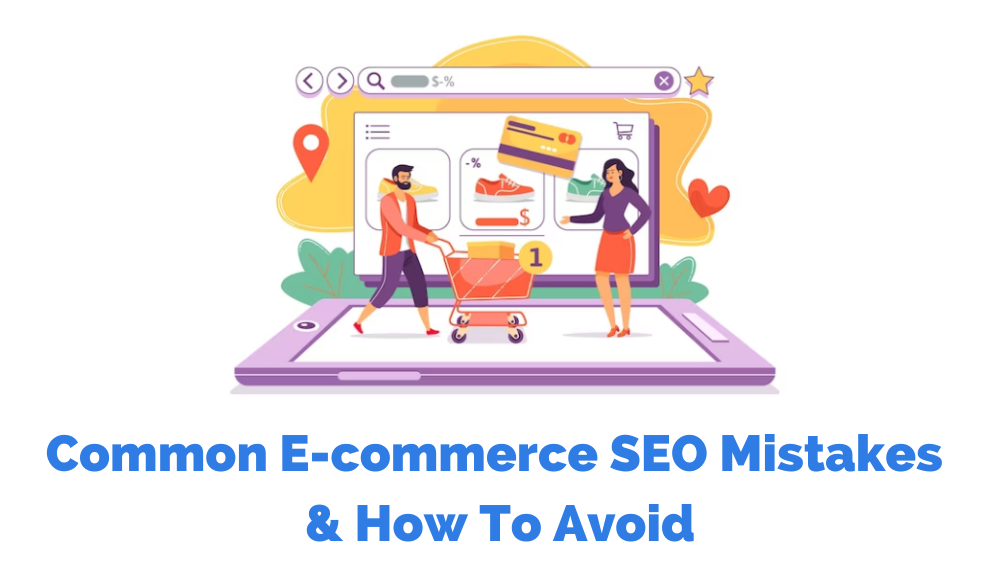In today’s digital age, having an e-commerce store has become an essential part of running a successful business. However, simply setting up an online store is not enough to ensure success. Search engine optimization (SEO) is an essential aspect of e-commerce that can make or break a business.
Unfortunately, many businesses make common e-commerce SEO mistakes that can hinder their visibility and reduce their chances of success. Here we have discussed the most common e-commerce SEO mistakes and how to avoid them.
Keyword Stuffing
A common e-commerce SEO error that most people commit is keyword stuffing. To manipulate search engine rankings, it involves overusing keywords in content, meta descriptions, and titles. Search engines now identify this approach and will penalize pages that utilize it, even though it may have worked in the past. You should, however, concentrate on producing high-quality content that is beneficial to the user and contains pertinent keywords.
Neglecting Product Description
People usually overlook product descriptions; however, it is a critical component of e-commerce SEO. In addition to assisting customers in making informed purchases, having distinctive and detailed product descriptions also aids search engines in comprehending the nature of your offering and how it pertains to user search queries. You should invest the time necessary to develop in-depth, distinctive product descriptions that contain relevant keywords.
Duplicate Content
Duplicate content is another common e-commerce SEO mistake that arises when a company uses the same content on many pages or across various websites. This may be done intentionally by duplicating text from rival websites or unintentionally by using manufacturer descriptions. Duplicate content can hinder search engine results, as it becomes difficult for search engines to decide which pages to index and increase the risk of plagiarized content penalties. Avoid this error by producing original material for every page and refrain from stealing content from rivals.
Ignoring Mobile Optimization
Mobile optimization is a vital aspect of e-commerce SEO. You must ensure your website is optimized for mobile consumers because more than half of the traffic comes from mobile devices; this entails a responsive layout, website speed, and easy navigation. Neglecting to optimize for mobile might result in a bad user experience and lower search engine rankings.
Overlooking Local SEO
Local SEO is another crucial characteristic of e-commerce SEO that you must not neglect. Optimizing your website for local search terms like “(business name) near me,” for example, “coffee shop near me,” is known as local SEO. This entails improving the information on your Google My Business page, producing regional content, and establishing regional citations. Neglecting local SEO can lower visibility in local search results and affect search engine rankings.
Disregarding Technical SEO
Technical SEO is another essential aspect that some people overlook. The backend of your website must be optimized for search engines as part of technical SEO. It entails improving your website’s speed, fixing broken links, and ensuring security. Neglecting technical part can lower user experience and affect the rankings.
Focusing Only on the Ranking
High rankings are essential, but they are not the only factor you should pay attention to. To ensure that your website produces sales and offers a positive user experience, you should also pay attention to indicators like conversion rates, bounce rates, and click-through rates.
Not Using Event Tracking
With web and shopping analytics, you can map the entire customer lifecycle, track the health of their e-commerce store, and identify areas where client retention is deteriorating. If you don’t employ such a tool, you could be losing money by disregarding data that could provide a deeper understanding of user behavior. You can only improve conversion rates on your best-selling and most-visited product pages by reading more about them.
Lack of Image Alt Texts
Although it is relatively simple to overlook, failing to include image alt text can be potentially lethal. Alt image texts provide too many SEO advantages to disregard. Your photos are the most important type of content you can use on an e-commerce site if you consider the actual sizeable content pieces you can use. Although it may require a little more work, optimizing the alternate image caption of your photos is a simple approach to target direct search terms and provide the search engines with valuable context regarding those content blocks.
Lack of Sitemap and Robots.Txt
The sitemap and robots.txt files from your e-commerce site are essential for crawling. You require automated sitemaps that change as new pages and updated versions of your items are introduced. It helps ensure that your crawlers can advantageously crawl your fresh content, categories, and elements, and they can index them as effectively as possible.
Most reliable e-commerce content management systems (CMSs), like Shopify, include automated sitemaps or plugins for them. Make sure your clients have something similar in place. Crawlers are under a lot of stress when things are added, removed, or moved across categories.
If you want to improve the performance of your website, it is crucial to ignore these mistakes. However, these are not all. You must stay updated with Google updates and ensure your website adapts to all the updates timely. If you want help with your e-commerce SEO, we are happy to help you. Connect with us for consultation.

